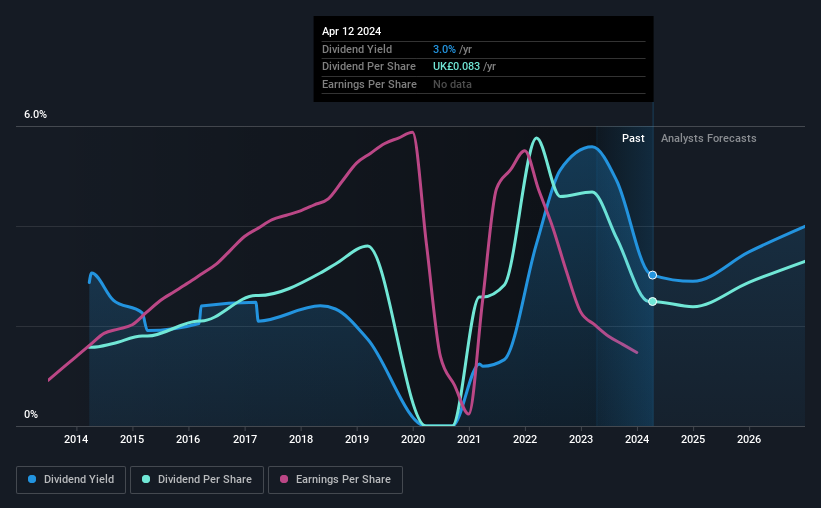Marshalls (LON:MSLH) Is Due To Pay A Dividend Of £0.057
The board of Marshalls plc (LON:MSLH) has announced that it will pay a dividend on the 1st of July, with investors receiving £0.057 per share. This means that the dividend yield is 3.0%, which is a bit low when comparing to other companies in the industry.
See our latest analysis for Marshalls
Marshalls' Payment Has Solid Earnings Coverage
Even a low dividend yield can be attractive if it is sustained for years on end. Prior to this announcement, the company was paying out 113% of what it was earning, however the dividend was quite comfortably covered by free cash flows at a cash payout ratio of only 35%. Given that the dividend is a cash outflow, we think that cash is more important than accounting measures of profit when assessing the dividend, so this is a mitigating factor.
Looking forward, earnings per share is forecast to rise by 199.0% over the next year. Assuming the dividend continues along the course it has been charting recently, our estimates show the payout ratio being 40% which brings it into quite a comfortable range.
Dividend Volatility
While the company has been paying a dividend for a long time, it has cut the dividend at least once in the last 10 years. Since 2014, the annual payment back then was £0.0525, compared to the most recent full-year payment of £0.083. This implies that the company grew its distributions at a yearly rate of about 4.7% over that duration. It's encouraging to see some dividend growth, but the dividend has been cut at least once, and the size of the cut would eliminate most of the growth anyway, which makes this less attractive as an income investment.
Dividend Growth Potential Is Shaky
With a relatively unstable dividend, it's even more important to see if earnings per share is growing. Marshalls' EPS has fallen by approximately 22% per year during the past five years. Dividend payments are likely to come under some pressure unless EPS can pull out of the nosedive it is in. On the bright side, earnings are predicted to gain some ground over the next year, but until this turns into a pattern we wouldn't be feeling too comfortable.
Marshalls' Dividend Doesn't Look Sustainable
Overall, the dividend looks like it may have been a bit high, which explains why it has now been cut. In the past, the payments have been unstable, but over the short term the dividend could be reliable, with the company generating enough cash to cover it. This company is not in the top tier of income providing stocks.
Investors generally tend to favour companies with a consistent, stable dividend policy as opposed to those operating an irregular one. Still, investors need to consider a host of other factors, apart from dividend payments, when analysing a company. For instance, we've picked out 2 warning signs for Marshalls that investors should take into consideration. Looking for more high-yielding dividend ideas? Try our collection of strong dividend payers.
Have feedback on this article? Concerned about the content? Get in touch with us directly. Alternatively, email editorial-team (at) simplywallst.com.
This article by Simply Wall St is general in nature. We provide commentary based on historical data and analyst forecasts only using an unbiased methodology and our articles are not intended to be financial advice. It does not constitute a recommendation to buy or sell any stock, and does not take account of your objectives, or your financial situation. We aim to bring you long-term focused analysis driven by fundamental data. Note that our analysis may not factor in the latest price-sensitive company announcements or qualitative material. Simply Wall St has no position in any stocks mentioned.

 Yahoo Finance
Yahoo Finance 
